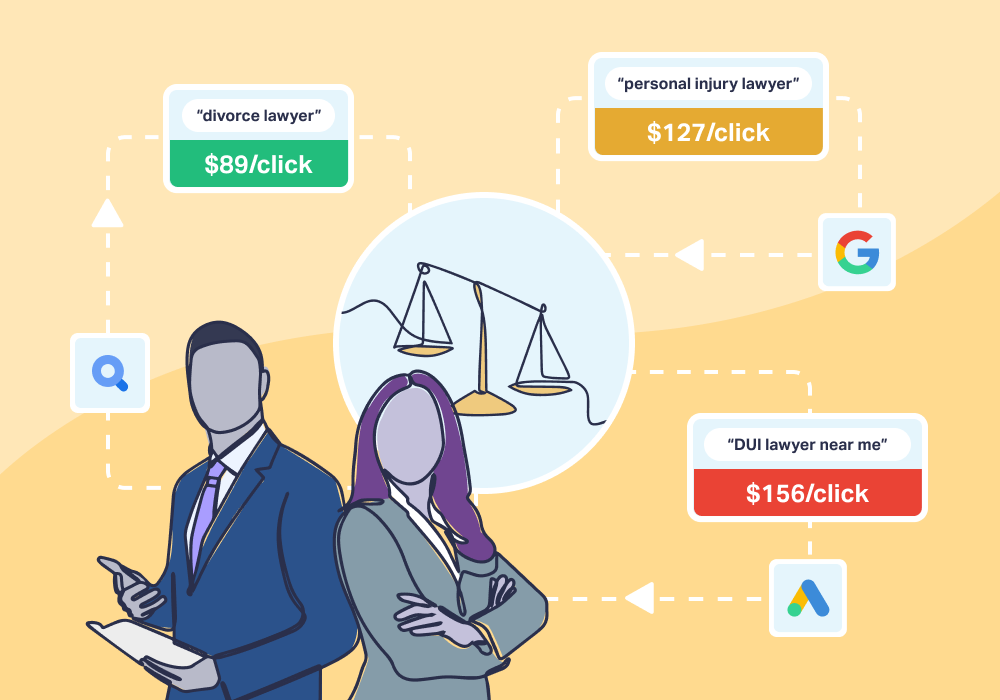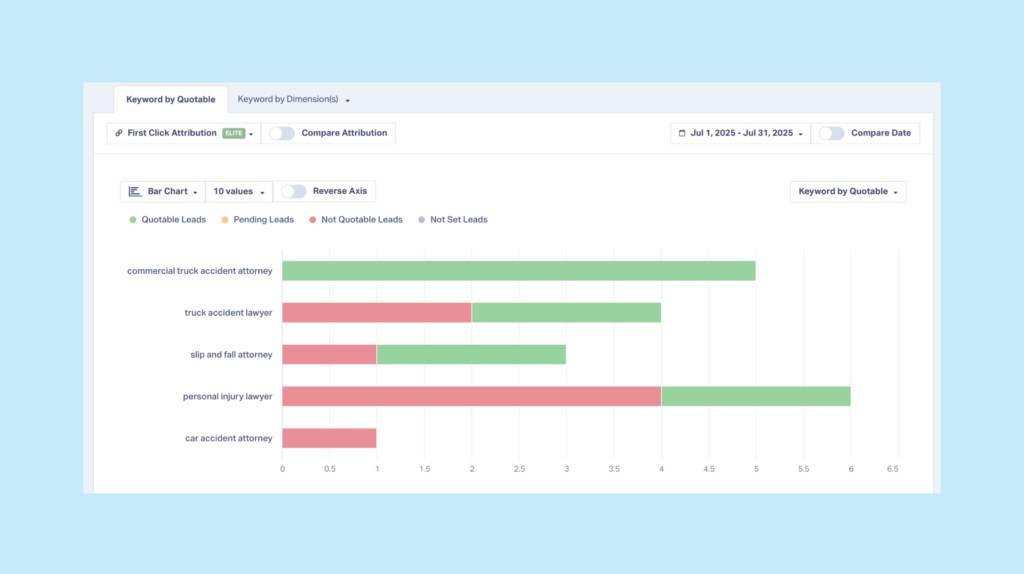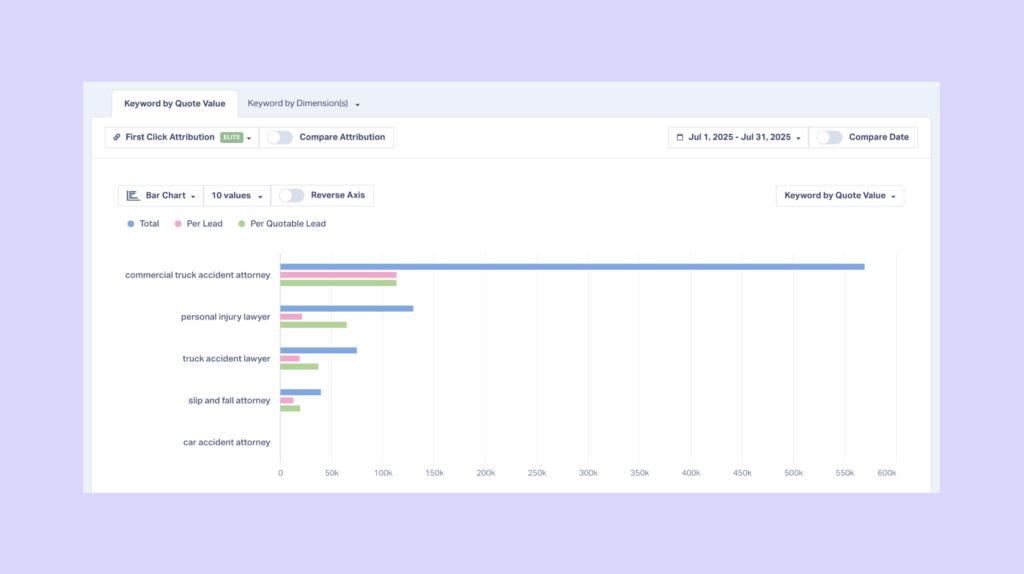
You just checked your Google Ads account and winced. $127 for a single click on "personal injury lawyer." $89 for "divorce attorney." $156 for "DUI lawyer near me."
These aren't outliers—they're the reality of legal PPC advertising, where a single click can cost more than most industries spend on an entire day's worth of traffic. Yet some law firms thrive with these astronomical costs while others hemorrhage money on campaigns that never generate a single qualified client.
The difference isn't luck or unlimited budgets. It's strategic campaign management combined with proper measurement of what actually matters: which clicks turn into consultations, and which consultations become paying clients.
Why Every Click Costs a Fortune…
Legal keywords consistently rank among the most expensive in Google Ads, and for good reason. The lifetime value of a single client can range from $5,000 for a simple divorce to over $500,000 for complex commercial litigation.
When firms are competing for clients worth hundreds of thousands of dollars, they can afford to bid aggressively.
…And Traditional PPC Wisdom Fails
This creates a unique dynamic where standard advice becomes meaningless. "Start with a $10 daily budget" is useless when competitors spend $1,000+ daily. "Aim for CPCs under $5" is irrelevant in markets where $200+ clicks are normal. And "focus on high search volume" often leads to unqualified traffic.
Read More: Agency Strikes Gold with £205,000 Win by Mining Niche Keywords [Case Study]
How to Make PPC Profitable for Your Law Firm
Legal PPC isn't about finding cheap clicks—it's about finding profitable ones. A $250 click that generates a $50,000 case is infinitely more valuable than a $5 click that results in an unqualified tire-kicker.
However, most firms struggle because they can't accurately track which expensive clicks actually generate revenue. Without this visibility, they're essentially gambling with five-figure monthly budgets.
How Lead Tracking Solves the Profitable Click Problem
Here's the core problem: Google Ads can tell you that someone clicked your $150 "car accident lawyer" ad and called your office, but it can't tell you whether that caller became a $75,000 client or hung up as soon as you picked up the phone. Without knowing which expensive keywords generate actual revenue, you're making bidding decisions blind.
Traditional analytics track conversions, not outcomes. They'll show you that 10 people submitted contact forms from your personal injury campaign, but they won't reveal that 8 were spam, 1 was an existing client, and only 1 became a paying case worth $25,000.
WhatConverts solves this by connecting every lead back to its original marketing source and allowing you to track the complete outcome—from the specific keyword that generated the click, through the consultation process, to the final case value. When a prospect becomes a paying client, you can see exactly which $150 click generated that $75,000 case, enabling you to bid more aggressively on proven profitable keywords while reducing spend on expensive clicks that never convert to revenue.
How It Works in Practice
Let's say you spent $6,800 last month across three main keyword groups. Google Ads shows you generated 6 total conversions across all campaigns.
| Campaign Keyword | “Personal injury lawyer” | “Truck accident attorney” | “Slip and fall lawyer” |
| Total Cost | $2,500 | $2,800 | $1,500 |
| Total Conversions | 5 | 2 | 1 |
| Cost per Conversion | $500 | $1,400 | $1,500 |
Based on this data, you'd naturally want to increase budget on "personal injury lawyer" since it's generating conversions at just $500 each—five times cheaper than your other campaigns.
What WhatConverts Reveals
Google Ads can only track conversions. WhatConverts tracks the leads behind those conversions, and continues tracking them all the way to their final outcomes. With comprehensive lead tracking data, here’s what you see:
| Campaign Keyword | “Personal injury lawyer” | “Truck accident attorney” | “Slip and fall lawyer” |
| Total Cost | $2,500 | $2,800 | $1,500 |
| Total Conversions | 5 | 2 | 1 |
| Cost per Conversion | $500 | $1,400 | $1,500 |
| Leads that Became Customers | 0 | 2 | 1 |
| Average Quote Value per Customer | - | $50,000 | $250,000 |
| Campaign ROI | 0 | 18x | 167x |
As it turns out, the “conversions” from your “personal injury lawyer” campaign were actually four spam calls and one price shopper collecting quotes from multiple attorneys. The campaign you thought was your best performer actually generated zero revenue.
Meanwhile, both conversions from your “truck accident attorney” campaign and the sole conversion from your “slip and fall lawyer” campaign all became paying clients. Based on your case history, you know that truck accidents net $50,000 in profit on average, while the average slip and fall case results in a quarter of a million dollar payday. While those keywords were more expensive, they’re bringing in clients worth far more than the campaigns cost.
In other words: Without WhatConverts, you would have increased budget on the worst-performing campaign and reduced spend on your only profitable ones.
Read More: How to Optimize Google Ads to Only Target Qualified Leads
Measuring What Actually Matters
In an industry where individual clicks cost $100+, marketers need to measure campaigns based on the business value they generate, not just the number of conversions they produce.
Standard PPC metrics measure by clicks and conversions. To truly measure value, you need to be measuring by qualified leads.
A lead tracking system like WhatConverts doesn’t just allow you to find individually valuable keywords. it transforms your entire PPC operation into a lead-based measurement and reporting system. Instead of optimizing campaigns based on cost per conversion, you can optimize based on cost per qualified lead and revenue per campaign.
When you switch to lead-based measurement, you can see which campaigns consistently generate prospects that actually schedule consultations as opposed to those that primarily result in forms and calls from people who have no real intention of hiring your firm.
Measuring by qualified leads will dramatically improve your marketing ROI, but you can optimize even further by tracking case values and attaching them to your leads as well.
Even after eliminating zero-revenue keywords, significant differences remain among your profitable ones. When you connect case values to leads, you can measure campaigns and keywords based on actual revenue generated rather than lead volume—revealing that some keywords consistently produce $75,000 cases while others generate $5,000 ones.
Strategic Keyword Selection That Actually Works
As you start tracking, measuring, and optimizing based on actual lead outcomes, you’ll begin to surface patterns in the types of keywords that consistently generate value for your firm.
For example, specific practice areas tend to outperform general terms. A keyword like “commercial truck accident attorney” typically generates higher-value cases than broad “car accident lawyer” terms, even though it’s likely to cost more per click. The specificity attracts prospects who have already done their initial research, understand that they need specialized help, and are actively looking for a consultation.
Geographic targeting also tends to reduce waste while improving conversion quality. You can get more out of a generalized personal injury keyword by opting for a longtail equivalent like “personal injury lawyer downtown Manhattan” and customizing your ad settings to target your service area.
The key insight is that these patterns only become visible when you're tracking actual case outcomes, not just conversion volume. What looks like a low-performing keyword based on conversion count might actually be your most profitable when you factor in case values.
Building Long-Term PPC Success
Success in legal PPC requires treating campaigns as strategic business assets rather than short-term marketing experiments. Start by implementing proper tracking systems—you can't optimize what you can't measure.
Focus campaign structure and keyword selection on your specific practice areas and market conditions. What works for personal injury might not work for family law, and competitive markets require different approaches than smaller ones.
With proper strategy, measurement, and optimization, those $100+ clicks can become the foundation of a thriving practice. The key is ensuring every expensive click gets the tracking and attention it deserves.
Ready to start tracking your valuable keywords and turning your PPC strategy into profit? Start your 14-day free trial today.
Get a FREE presentation of WhatConverts
One of our marketing experts will give you a full presentation of how WhatConverts can help you grow your business.
Schedule a Demo
Grow your business with WhatConverts







